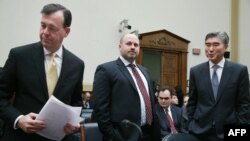The United States aims to use new sanctions imposed on North Korea over the cyberattack on Sony Pictures to cut off the country's remaining links to the international financial system, a senior U.S. Treasury official said Tuesday.
Daniel Glaser, assistant secretary for terrorist financing at the U.S. Treasury Department, said past sanctions had already discouraged “hundreds” of overseas banks, including China's major commercial banks, from doing business with North Korea.
New sanctions announced by President Barack Obama on Jan 2. provided “a tremendous amount of flexibility” and the goal was to identity remaining financial institutions that allowed North Korea access to the global system, which could face sanction themselves, Glaser told a House of Representatives briefing.
“We could target any North Korean government agency; we could target any North Korean government official ... we could apply sanctions with respect to any individual or entity who is providing them, in turn, material support,” he said.
U.S. Representative Ed Royce of California, chairman of the House Foreign Affairs Committee, called for use of the full scope of the new sanctions announced after U.S. authorities said North Korea was behind the Sony attack. North Korea has denied involvement.
“The significance of this new executive order may come from the broad power it gives the president to target anyone who is a part of the North Korean government, or is assisting them in any way — that is, if the administration chooses to use it to its full advantage,” he told the briefing.
“We need to step up and target those financial institutions in Asia and beyond that are supporting the brutal and dangerous North Korean regime,” he added.
When challenged by Royce about “a number of small banks” still doing business with North Korea and the need to choke off the country's access to hard currency, Glaser replied: “That's exactly what we are trying to do.”
Royce said he hoped a bipartisan bill he sponsored that would label North Korea “a primary money-laundering concern” would be passed by the Senate this year.
North Korea's main economic ties are with China and, according U.S. government reports, the country's tiny economy has supported itself with moneymaking scams ranging from counterfeiting $100 bills to illicit arms sales and drug smuggling.
Also Tuesday, the United States said again that North Korea's offer to temporarily halt nuclear tests if Washington agreed to temporarily end joint military exercises with South Korea was an implicit threat.
State Department spokeswoman Marie Harf said North Korea was inappropriately linking routine joint military exercises in South Korea to the possibility of its doing a nuclear test. She said any nuclear test by Pyongyang violated multiple U.N. Security Council resolutions and the country’s commitment under a 2005 six-party joint statement.
Harf said the U.S. called on North Korea to immediately cease all threats and to take steps toward denuclearization.
A North Korean official at the United Nations, An Myong Hun, told reporters Tuesday that the U.S. must stop its annual joint military exercises with the South. He said U.S. policy had hindered relations between his country and South Korea.
Harf said the U.S. believes joint military exercises with South Korea don’t create tension so long as they remain transparent and defense-oriented.
"It is needless to say that there can be no real or trustful dialogue, nor improved inter-Korean relations, in such a gruesome atmosphere in which war exercises are staged against a dialogue partner," the North Korean official said.
Some information for this report came from Reuters.





